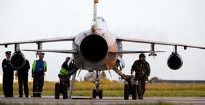Rebels May Ask for UN Airstrikes
In a sign of mounting frustration among rebel leaders over Col. Muammar el-Qaddafi’s diminished but unyielding grip on power, the revolutionary council here is debating whether to ask for Western airstrikes under the United Nations banner, according to four people with knowledge of the deliberations.
By invoking the United Nations, the council, made up of lawyers, academics, judges and other prominent figures, is seeking to draw a distinction between such airstrikes and foreign intervention, which the rebels said they emphatically opposed.
“He destroyed the army; we have two or three planes,” the council’s spokesman, Abdel-Hafidh Ghoga, said. He refused to say if there would be any imminent announcement about such strikes, but he wanted to make it clear: “If it is with the United Nations, it is not a foreign intervention.”
That distinction is lost on many people, and any call for foreign military help carries great risks.
The antigovernment protesters in Libya, like those in Tunisia and Egypt, have drawn broad popular support — and great pride — from their status as homegrown movements that have defied autocrats without outside help.
Any intervention, even one with the imprimatur of the United Nations, could play into the hands of Colonel Qaddafi, who has called the uprising a foreign plot by Western powers that seek to occupy Libya.
“If he falls with no intervention, I’d be happy,” said one senior member of the revolutionary council here. “But if he’s going to commit a massacre, my priority is to save my people.”
There was no indication that the United Nations Security Council’s members would approve such a request, or that most Libyans who are seeking to topple Colonel Qaddafi would welcome it. Among the Security Council’s members, Russia has dismissed talk of a no-fly zone to curb strikes by the Libyan Air Force still under Colonel Qaddafi’s control, and China usually votes against foreign intervention.
The discussions appeared to signal a rebel movement that is impatient with a military stalemate that has crippled the country. The airstrikes’ supporters hoped they might dislodge Colonel Qaddafi from crucial strongholds, including a fortified compound in the capital, Tripoli.
The council is only considering strikes against the compound and assets like radar stations, according to the people briefed on the discussions, who requested anonymity because no formal decision had been made.
The United States acknowledged the sensitivity concerning outside intervention.
Secretary of State Hillary Rodham Clinton told the House Foreign Affairs Committee on Tuesday that the Obama administration knew that the Libyan opposition was eager to be seen “as doing this by themselves on behalf of the Libyan people — that there not be outside intervention by any external force.”
Tensions were high in Benghazi on Tuesday, the day after government warplanes attacked sites south of the city and special forces retook a rebel-held oil refinery at Ras Lanuf in central Libya.
Click here to read more.


